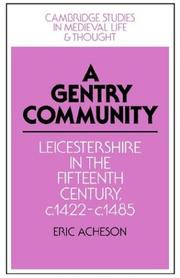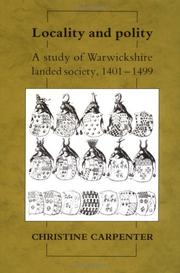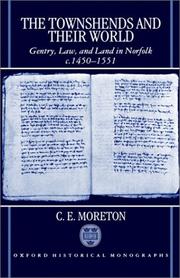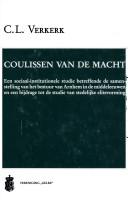| Listing 1 - 4 of 4 |
Sort by
|

ISBN: 0521405335 0521524989 0511560192 Year: 1992 Publisher: Cambridge Cambridge University press
Abstract | Keywords | Export | Availability | Bookmark
 Loading...
Loading...Choose an application
- Reference Manager
- EndNote
- RefWorks (Direct export to RefWorks)
This book examines the fifteenth-century gentry of Leicestershire under five broad headings: as landholders, as members of a social community based on the county, as participants in and leaders of the government of the shire, as members of the wider family unit and, finally, as individuals. Economically assertive, they were also socially cohesive, this cohesion being provided by the shire community. The shire also provided the most important political unit, controlled by an oligarchy of superior gentry families who were relatively independent of outside interference. The basic social unit was the nuclear family, but external influences, provided by concern for the wider kin, the lineage or economic and political advancement, were not major determinants of family strategy. Individualism among the gentry was already established by the fifteenth century, revealing its personnel as a self-assured and confident stratum in late medieval English society.
Gentry --- -Gentry, Landed --- Landed gentry --- Squires --- Upper class --- History --- -Great Britain --- Great Britain --- Leicestershire (England) --- -History --- Gentry, Landed --- Leicestershire, Eng. --- Leicestershire --- Leicester (England : County) --- County of Leicestershire (England) --- Rutland (England) --- East Midlands (England) --- History. --- Arts and Humanities

ISBN: 0521370167 9780521370165 9780521122849 9780511522376 0521122848 0511522371 Year: 1992 Publisher: Cambridge Cambridge University Press
Abstract | Keywords | Export | Availability | Bookmark
 Loading...
Loading...Choose an application
- Reference Manager
- EndNote
- RefWorks (Direct export to RefWorks)
This is a comprehensive study of minor landowners - the gentry - in one county in fifteenth-century England. In common with other local studies of the later Middle Ages, it builds upon the seminal work of K. B. McFarlane, looking at the political and social world in the localities from which the nobles drew their power. The book aims to present a rounded picture of the experiences of the gentry, relating their private and their public lives, and their permanent concerns to the changing needs of local and national politics. Its approach is thus both thematic, exploring the main elements, often private in nature, which moulded their public actions, such as marriage, estate management and senses of family, and chronological, presenting a detailed narrative of politics and account of political structures and relationships. The book is intended as a contribution to the history of England as a whole in the fifteenth century and to the study of the long-term development of the English landed classes and the English constitution.
Landowners --- Land tenure --- History --- Warwickshire (England) --- Gentry --- Arts and Humanities --- Landowners - England - Warwickshire - History --- Land tenure - England - Warwickshire - History --- Warwickshire (England) - Gentry - History --- History. --- Agrarian tenure --- Feudal tenure --- Freehold --- Land ownership --- Land question --- Landownership --- Tenure of land --- Land use, Rural --- Real property --- Land, Nationalization of --- Serfdom --- Landholders --- Owners of land --- Gentry, Landed --- Landed gentry --- Squires --- Upper class

ISBN: 0198202997 Year: 1992 Volume: *66 Publisher: Oxford Clarendon
Abstract | Keywords | Export | Availability | Bookmark
 Loading...
Loading...Choose an application
- Reference Manager
- EndNote
- RefWorks (Direct export to RefWorks)
Land use, Rural --- -Land tenure --- -Gentry --- -Landowners --- -Landholders --- Owners of land --- Land tenure --- Gentry, Landed --- Landed gentry --- Squires --- Upper class --- Agrarian tenure --- Feudal tenure --- Freehold --- Land ownership --- Land question --- Landownership --- Tenure of land --- Real property --- Land, Nationalization of --- Landowners --- Serfdom --- Rural land use --- Land use --- Agriculture --- History --- -Law and legislation --- -History --- -Biography --- Townshend, Roger Sir --- -Townsend family --- Family --- Norfolk (England) --- -Norfolk --- County of Norfolk (England) --- Townshend, Roger, Sir --- Land use [Rural ] --- 16th century --- Law and legislation --- Gentry --- Biography --- Norfolk (England) - History. --- Townshend, Roger, Sir, d. 1493 - Family. --- Land use, Rural - England - Norfolk - History - 16th century. --- Land tenure - Law and legislation - England - Norfolk. --- Gentry - England - Norfolk - History - 16th century. --- Landowners - England - Norfolk - Biography. --- Townsend family. --- -Agrarian tenure --- Landholders

ISBN: 9065502467 Year: 1992 Volume: 42 14 Publisher: Hilversum Verloren
Abstract | Keywords | Export | Availability | Bookmark
 Loading...
Loading...Choose an application
- Reference Manager
- EndNote
- RefWorks (Direct export to RefWorks)
History of the Netherlands --- anno 500-1499 --- Arnhem --- Municipal government --- Administration municipale --- History --- Histoire --- Arnhem (Netherlands) --- Arnhem (Pays-Bas) --- Social conditions --- Conditions sociales --- 949.282 ARNHEM --- Gentry --- -Municipal corporations --- -Social history --- -Descriptive sociology --- Social history --- Sociology --- Cities and towns --- Municipal corporations --- Municipal law (Municipal corporations) --- Public corporations (Muncipal corporations) --- Corporations --- Metropolitan government --- Town laws, Medieval --- Gentry, Landed --- Landed gentry --- Squires --- Upper class --- Geschiedenis van Nederland: provincie Gelderland:--reg./lok.--ARNHEM --- Law and legislation --- -Arnhem (Netherlands) --- -Genealogy --- Social life and customs --- -Geschiedenis van Nederland: provincie Gelderland:--reg./lok.--ARNHEM --- 949.282 ARNHEM Geschiedenis van Nederland: provincie Gelderland:--reg./lok.--ARNHEM --- Arenacum (Netherlands) --- Arecanum (Netherlands) --- Arenacio (Netherlands) --- Arenatium (Netherlands) --- Arnemium (Netherlands) --- Arnhemia (Netherlands) --- Arnhemum Geldrorum (Netherlands) --- Harenatium (Netherlands) --- Arnhemium (Netherlands) --- Arnhemia in Ducatu Geldriae (Netherlands) --- Genealogy. --- Social life and customs. --- Netherlands --- Medieval, 500-1500 --- Genealogy --- Middle Ages, 500-1500 --- History. --- Public corporations (Municipal corporations) --- Arnhem [Gelderland]
| Listing 1 - 4 of 4 |
Sort by
|

 Search
Search Feedback
Feedback About UniCat
About UniCat  Help
Help News
News